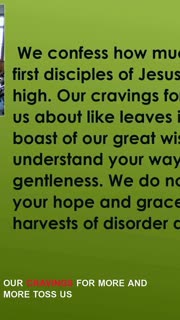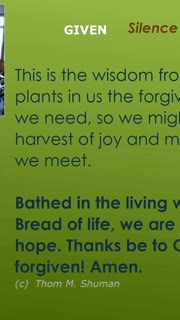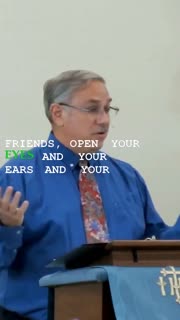Embracing Humility: The Path to True Greatness
Devotional
Sermon Summary
Bible Study Guide
Sermon Clips
1. "When we try to live the way that God wishes us to live, we still can sometimes follow bad advice. Or walk down the shadowed streets. Yet God watches over us and calls us to confess so we might be welcomed into the embracing arms of mercy and healing." [13:29] (24 seconds)
2. "Our cravings for more and more toss us about like leaves in the fall winds. We boast of our great wisdom. Yet do not understand your ways of peace and gentleness. We do not plant ourselves in your hope and grace. And so reap harvest of disorder. And so reap harvest of suffering and conflict." [14:39] (22 seconds)
3. "We are given new life and hope. Thanks be to God. We are forgiven. Our first reading this morning comes from the letter of James in the third chapter. And our reader is Adam Southergill." [15:53] (16 seconds)
4. "Help us to remain consistent in our relationship with you and in our daily walk as followers of Jesus. May we return good for evil and bless those who curse us. Keep us focused on following the footsteps of Christ and doing as he did. God, help us to remember how precious we are in your sight and to refrain from undermining our worth or the worth of others by comparing ourselves to one another." [20:41] (31 seconds)
5. "Make us fitting witnesses and grant us the grace to be the people who reach out at every opportunity that comes to us, to be instruments of your healing and transforming power. We thank you, Lord, not only of ourselves, not only of our families, but we think of the world and those in it who need wholeness, who need peace, who need a reason to have hope." [21:52] (27 seconds)
6. "Friends, open your eyes and your ears and your hearts to perceive a life of generosity, to which you've been called to, and for which you have been created. Let us gather our examples of fruitfulness as we receive our offering here. And if you are online, you can scan the QR code or go to the giving page on our website." [25:13] (20 seconds)
7. "If you want to be first, you've got to be last, dead last, and the servant of all. Then he takes a small child in his arms, and having him stand among them, he takes the child and says to them, whoever welcomes one of these little children in my name, welcomes me. And whoever welcomes me doesn't just welcome me, but the one who sent me." [33:36] (28 seconds)
8. "Jesus calls the 12, and he calls us away from our arguments about who is greatest, and who deserves more, and who should call the shots, and turns our mind instead to the question of our attitude and how willing are we to be humble and to serve others." [34:09] (18 seconds)
9. "Life lived according to the way of Christ, the life of opening one's arms and welcoming people into our embrace and showing them that we care. It's about opening the pipeline at both ends so that nothing impedes the flow of power, the flow of love that produced the harvest we all need and desire, the harvest that comes when we live as peacemakers." [36:13] (26 seconds)
10. "So friends, what is it that you want out of life? What is it that you want from God? I think most of us are looking for a better life for ourselves and our families and the world. We'd like to feel more at peace. We'd like to have more joy and happiness. We'd like to see an end to the world's problems." [37:37] (22 seconds)
Ask a question about this sermon
2. "Our cravings for more and more toss us about like leaves in the fall winds. We boast of our great wisdom. Yet do not understand your ways of peace and gentleness. We do not plant ourselves in your hope and grace. And so reap harvest of disorder. And so reap harvest of suffering and conflict." [14:39] (22 seconds)
3. "We are given new life and hope. Thanks be to God. We are forgiven. Our first reading this morning comes from the letter of James in the third chapter. And our reader is Adam Southergill." [15:53] (16 seconds)
4. "Help us to remain consistent in our relationship with you and in our daily walk as followers of Jesus. May we return good for evil and bless those who curse us. Keep us focused on following the footsteps of Christ and doing as he did. God, help us to remember how precious we are in your sight and to refrain from undermining our worth or the worth of others by comparing ourselves to one another." [20:41] (31 seconds)
5. "Make us fitting witnesses and grant us the grace to be the people who reach out at every opportunity that comes to us, to be instruments of your healing and transforming power. We thank you, Lord, not only of ourselves, not only of our families, but we think of the world and those in it who need wholeness, who need peace, who need a reason to have hope." [21:52] (27 seconds)
6. "Friends, open your eyes and your ears and your hearts to perceive a life of generosity, to which you've been called to, and for which you have been created. Let us gather our examples of fruitfulness as we receive our offering here. And if you are online, you can scan the QR code or go to the giving page on our website." [25:13] (20 seconds)
7. "If you want to be first, you've got to be last, dead last, and the servant of all. Then he takes a small child in his arms, and having him stand among them, he takes the child and says to them, whoever welcomes one of these little children in my name, welcomes me. And whoever welcomes me doesn't just welcome me, but the one who sent me." [33:36] (28 seconds)
8. "Jesus calls the 12, and he calls us away from our arguments about who is greatest, and who deserves more, and who should call the shots, and turns our mind instead to the question of our attitude and how willing are we to be humble and to serve others." [34:09] (18 seconds)
9. "Life lived according to the way of Christ, the life of opening one's arms and welcoming people into our embrace and showing them that we care. It's about opening the pipeline at both ends so that nothing impedes the flow of power, the flow of love that produced the harvest we all need and desire, the harvest that comes when we live as peacemakers." [36:13] (26 seconds)
10. "So friends, what is it that you want out of life? What is it that you want from God? I think most of us are looking for a better life for ourselves and our families and the world. We'd like to feel more at peace. We'd like to have more joy and happiness. We'd like to see an end to the world's problems." [37:37] (22 seconds)










